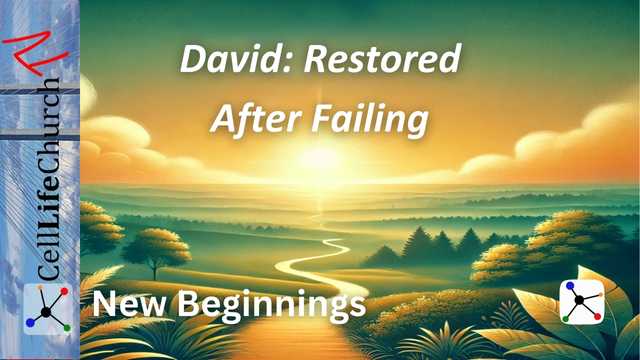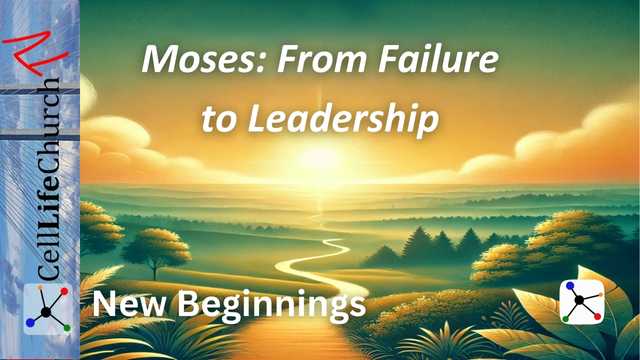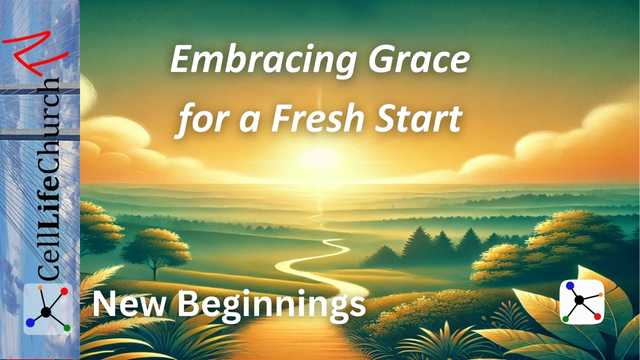Have you ever felt like your failures are too great for redemption? Discover how David’s story reveals that no mistake is beyond God’s ability to restore after failing, offering hope and renewal for your own life.
Estimated reading time: 5 minutes
Table of contents
Downloads and Links
Watch the video of this teaching at https://www.celllifechurch.tv/david-restored-after-failing/ or on our YouTube channel.
Introduction
The story of King David is one of the most well-known in the Bible, not only because of his triumph over Goliath but also because of his profound failures and ultimate restoration by God. In our previous teaching, we explored how Moses experienced restoration despite his shortcomings. Today, we turn to David’s life to see how God’s grace can transform even the most broken situations into new beginnings.
Have you ever felt like your mistakes have put you beyond God’s reach? David’s journey from failure to restoration proves otherwise. Let’s dive into his story, looking at three pivotal moments: his fall, his repentance, and his restoration, each offering timeless lessons and actionable steps for us today.
The Fall of David
Let us start by looking at the fall of David and reading 2 Samuel 11:1-5.
2 Samuel 11:1-5
(1) In the spring, at the time when kings go off to war, David sent Joab out with the king's men and the whole Israelite army. They destroyed the Ammonites and besieged Rabbah. But David remained in Jerusalem. (2) One evening David got up from his bed and walked around on the roof of the palace. From the roof he saw a woman bathing. The woman was very beautiful, (3) and David sent someone to find out about her. The man said, "She is Bathsheba, the daughter of Eliam and the wife of Uriah the Hittite." (4) Then David sent messengers to get her. She came to him, and he slept with her. (Now she was purifying herself from her monthly uncleanness.) Then she went back home. (5) The woman conceived and sent word to David, saying, "I am pregnant."
David’s story takes a dark turn in 2 Samuel 11. As king, he was called to lead his army in battle, yet he chose to stay behind, idling at home. This decision marked the beginning of his moral failure; his adultery with Bathsheba and the subsequent murder of her husband, Uriah.
David’s idleness opened the door to temptation, showing us that spiritual drift often begins with small compromises. As Proverbs 16:27 warns, “Idle hands are the devil’s workshop.”
David’s story reminds us that sin often starts subtly. A small compromise or an unchecked moment of weakness can escalate into actions that have devastating consequences. His fall warns us of the danger of letting our guard down, particularly during times of comfort or success.
Take time this week to evaluate areas of vulnerability in your life. Are there moments where idleness or complacency has led to spiritual drift? Reflect on how you can actively guard your heart against temptation. Ask the Holy Spirit to reveal to you areas you have not realized are leading you away from God.
Journal about a time when you struggled with complacency or temptation and what lessons you learned. Share with a trusted friend or mentor any areas where you feel spiritually vulnerable and ask for their prayers and accountability. Commit to daily prayer and Bible reading to remain spiritually vigilant and connected to God.
The Repentance of David
We read David’s sincere prayer of repentance in Psalm 51:1-4.
Psalms 51:1-4
(1) For the director of music. A psalm of David. When the prophet Nathan came to him after David had committed adultery with Bathsheba. Have mercy on me, O God, according to your unfailing love; according to your great compassion blot out my transgressions. (2) Wash away all my iniquity and cleanse me from my sin. (3) For I know my transgressions, and my sin is always before me. (4) Against you, you only, have I sinned and done what is evil in your sight; so you are right in your verdict and justified when you judge.
When the prophet Nathan confronted David about his sin, David could have defended himself, but instead, he was broken before God. His prayer in Psalm 51 reveals the depth of his repentance: “Have mercy on me, O God, according to your unfailing love.” David acknowledged his sin without excuses, asking for cleansing and a renewed spirit.
His repentance was prompted by the prophet Nathan’s bold confrontation, which highlights the importance of godly counsel in our lives. Sometimes, we need others to help us see our blind spots and turn back to God.
David’s repentance teaches us that true restoration begins with humility and honesty before God. It does not accuse others or try to deflect blame. Repentance isn’t about merely feeling regret; it’s about turning away from sin and seeking to align our hearts with God’s will.
Reflect on areas of your life where you may need to repent. Are there sins you’ve excused or avoided addressing? Repentance is not a sign of weakness but a pathway to restoration and renewed intimacy with God.
Write out a prayer of repentance, using Psalm 51 as a guide, and ask God for a clean heart and renewed spirit. Share with a trusted friend or mentor about your repentance journey and seek their encouragement and accountability. Commit to a week of intentional prayer, asking God to reveal areas in your heart that need transformation.
The Restoration of David
We read about the restoration of David in 2 Samuel 12:13-14 which says:
2 Samuel 12:13-14
(13) Then David said to Nathan, "I have sinned against the LORD." Nathan replied, "The LORD has taken away your sin. You are not going to die. (14) But because by doing this you have shown utter contempt for the LORD, the son born to you will die."
Although David faced significant consequences for his sin, he also experienced God’s forgiveness and restoration. In Psalm 32:1, David declares, “Blessed is the one whose transgressions are forgiven, whose sins are covered.” God’s grace not only forgave David but also allowed him to continue fulfilling his role in His divine plan. Through David’s lineage, Jesus Christ, the ultimate Redeemer, would come.
David’s sins had serious consequences, but they didn’t define his legacy. God’s promise to establish David’s throne forever was not revoked. Instead, David’s story became a testament to God’s grace and redemption.
This restoration didn’t erase the earthly consequences of David’s actions, but it reaffirmed his place in God’s plan. It also pointed to Jesus, the ultimate fulfillment of God’s promise to David, a Savior born from his lineage.
Consider an area of your life where you feel broken or distant from God. Restoration begins with believing that God’s grace is sufficient for you. Trust that He can bring beauty from ashes and purpose from pain.
Journal about an area in your life where you long for restoration and how you believe God is working in that area. Share your testimony of restoration with a friend or mentor to encourage them in their own faith journey. Thank God daily for His grace and actively look for ways to glorify Him in your restored life.
Conclusion
David’s story reminds us that no failure is too great for God’s grace. Through his fall, repentance, and restoration, we see the power of a God who redeems and restores.
Take time this week to meditate on God’s ability to restore what seems broken. Share David’s story with someone who might need encouragement, reminding them that no failure is too great for God’s grace.
Next week, we’ll explore Ruth, a story of faithfulness and redemption that reminds us how God works through even the most challenging circumstances to bring about new beginnings.








Leave A Reply